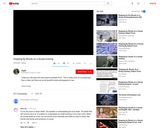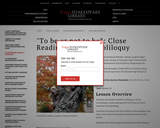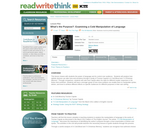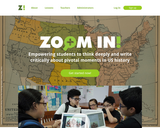
Reading of "Stopping By the Woods on a Snowy Evening" by Robert Frost
- Subject:
- English Language Arts
- Material Type:
- Simulation
- Provider:
- Urgelt
- Date Added:
- 03/20/2018

Reading of "Stopping By the Woods on a Snowy Evening" by Robert Frost

This three-day lesson plan leads students through a close reading and analysis of Hamlet's "To be or not to be" soliloquy. Students will analyze Hamlet's soliloquy in Act 3.1 by completing a close reading which will focus on word meaning and etymology. Students will analyze two film versions of the soliloquy and track actor choices throughout using two column note-taking. Finally, students will write an argument analysis on the soliloquy.

OVERVIEW: This lesson shares with students the power of language and its control over audience. Students will analyze how stylistic devices can alter tone and emotions through a study of Truman Capote’s In Cold Blood and “A Christmas Memory.†Through comparison, students will note how Capote alters his style for different reader responses in his fiction and nonfiction. Students will have a stronger grasp of how close analysis can enable them to manipulate syntax, diction, and tone to achieve different effects on specific audiences for different purposes in their own writing. FROM THEORY TO PRACTICE: Through a careful analysis of In Cold Blood and “A Christmas Memory,†students can recognize how authorial choices produce different reactions. Once readers contemplate Capote’s purpose in composing both texts, writers can practice altering language to experience the “conditions under which people learn to do new things with language†(NCTE Beliefs about the Teaching of Writing). Through noting Capote’s talent for rhetorical manipulation and purpose for doing so, students can demonstrate the understanding of writing for audience and purpose. More importantly, observing Capote’s success can instruct our students on how to improve their writing.

Zoom In provides 18 guided lessons on historical events where students focus on reading primary and secondary documents closely, gathering evidence, and writing an argumentative or explanatory essay. Throughout the process students are asked to do the following:
Read documents closely and criticallyIdentify author's point of view and purposeEngage in higher-order, text-based discussionsWrite explanatory and argumentative essays grounded in evidence